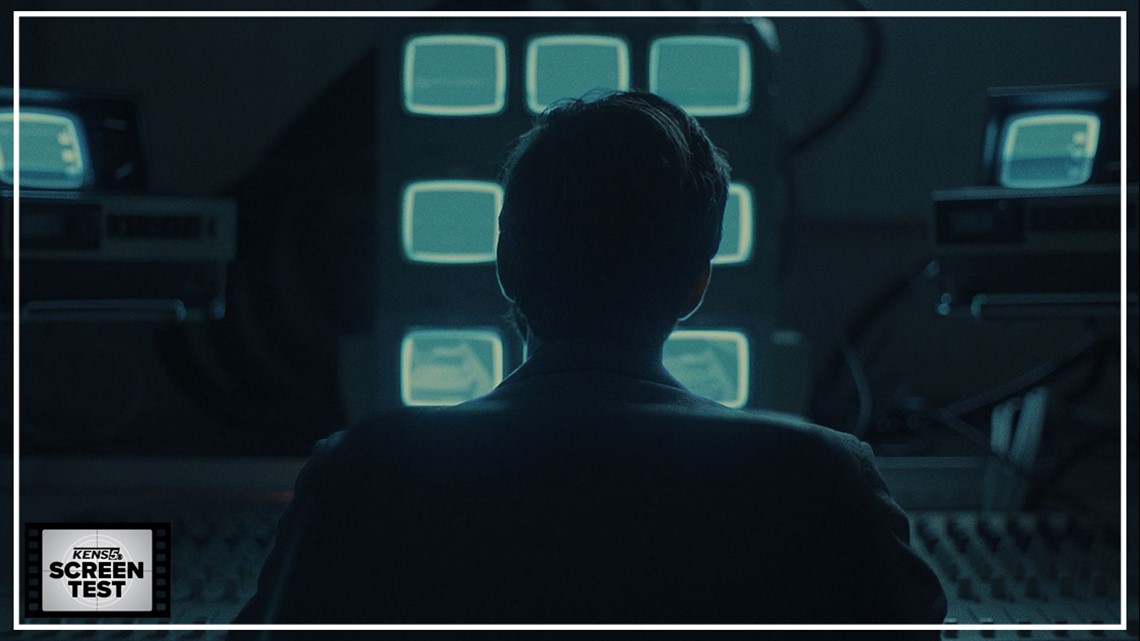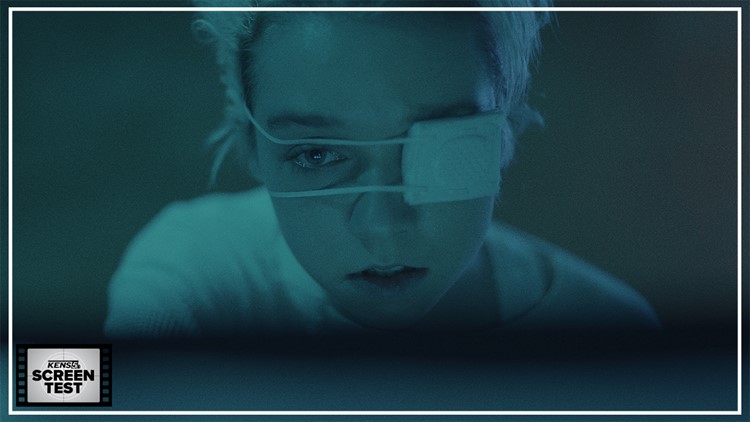Befitting a movie that seems to think it’s saying something profound about primal depths of the human condition, even the most casual moviegoer’s instincts will set off internal alarm bells at the sight of a teenage girl drifting off to sleep with cameras eying her in “Come True.” Our suspicions are primed, but kept from fully igniting (for now): The girl is Sarah (Julia Sarah Stone), and she’s decided to participate in this nightly “sleep study.” Sure, there’s something sinister about how tight-lipped the project’s lab coats are when asked what they’re hoping to find, but that’s easy to shrug off when Sarah’s volunteering means having a place to rest her head after leaving home following a fallout with her mom. For now, all she has is her nightmares. We have a little more—the chilling thought that Sarah and we, by proxy, aren’t the only ones exploring her dreams.
An intriguing but narratively self-defeating mash-up of “Stranger Things,” “Inception” and stark ‘80s paranoia, “Come True” – the second feature directorial effort from Anthony Scott Burns – puts a ghoulish spin on cinema’s defining ability to turn the audience into voyeurs. The way this study’s senior lead (most of the scientists are guys, same goes for the participants) makes an offhand observation about the position of Sarah’s feet while she’s snoozing is undeniably perverse, and the subtle invasions of privacy will tread closer to full literalization as motivations are eventually revealed. It isn’t just their casual approach that exacerbates the moody and spiritually corrupt atmosphere of Burns’s film (watch it in darkness for full effect, or at least to minimize your squinting), but the way they attempt to justify their borderline predatory gaze in the name of science and...well, whatever it is they’re “researching.”
This movie’s dramatic currency is its unknowns, but they yield little emotional value the more we search for a return on our investment. Burns structures his screenplay’s ambiguities – from Sarah’s background to the logistics of the study she enrolls in – like a chain-link fence. The issue is “Come True” spends so many of its 105 minutes testing the limits of its ambiguities that our curiosity ends up buckling under the strain; it doesn’t help that we begin to anticipate ulterior motivations long before Burns intends for us to. Nor does the script do enough to establish why we should fear the possibility of the entrenched menace in Sarah’s dreams threatening her while awake. A bit of misdirection, perhaps? Unfortunately not; the movie doubles down on its subconscious dives, and “Come True’s” scant screenplay begins to feel like an excuse to show off beguiling aesthetics and a literally nightmarish environment.
In that regard, at least, the movie inspires our wonder early on. The machinery used in sleep study harkens back to a throwback period of sci-fi stories as screens glow under foreboding magenta hues of nocturnal experimentation, and venturing through Sarah’s sleep-hastened subconscious means exploring darkened dreamscapes where limb bodies are suspended in midair and organic matter devolves into inky blobs. The stark cinematography, also Burns’s doing, is the most striking technical element of “Come True,” and we’re tempted to consider what the filmmaker could have suggested about this world with a stronger script, given there’s little to separate the moodiness of Sarah’s reality with the quiet subterranean terror of her nightmares. Even when she’s awake, wherever Sarah lives looks as if it’s perpetually stuck in the Upside Down. But there’s little in “Come True” to get us engaged in what we’re seeing beyond how it affects Sarah in the most immediate of circumstances. Otherwise, “Come True” creates too wide a gulf between its obscurities and its obviousness, and it’s unable to keep itself from stumbling into the void.
The film’s most effective asset in delaying that fall is Stone, whose presence is both enigmatic and vulnerable—in other words, she fits right into the foundational inexplicability Burns is angling for. Stone effectively embodies the exhaustion of a protagonist whose physicality suggests someone who could be either 8 or 18, and her performance as Sarah strays from tripping into naivete. She’s the most forcefully realized component of this world...which may or may not be an early hint as to where the story ends up.


Stone’s turn remains convincing and convincingly desperate as “Come True” more explicitly maneuvers into the uneasy invasiveness baked into the scientists’ motivations, inside and outside the lab. Burns attempts to cash in on his foundational contrast between the sleekly technological and the ominously metaphysical around the same time as we recognize that dreams are merely a different dimension on the other side of fragile boundaries—and they’re bound to come crashing down. While this might sound like “Come True” finally instilling Sarah’s plight with legible urgency, it mostly spends its third act bringing new meaning to sleepwalking through the narrative. A lack of potent thematic draw casts a pall on Burns’s increasingly harder pivots into the realm of horror, which is a shame for a movie that occasionally flashes hints of meaningful daring amid Sarah’s unexpectedly evolving bond with one of the study’s leaders.
But even “Come True’s” climactic tonal swerves might not be worth reading into, and the most off-putting realization is that Burns himself is the one suggesting so. He insists on inexplicability right up until the final frame, and a closing revelation that encourages us to re-examine everything we’ve seen up to this point while simultaneously proclaiming that none of it really matters in the end. Movies are generally more fun when they’re unpredictable, but “Come True” is an exception that accomplishes little to earn its ultimate frustrating contradiction. Instead, the film ends up contradicting itself. How’s that for a nightmare we can’t make sense of?
"Come True" is not rated. It's available to rent on digital platforms Friday.
Starring: Julia Sarah Stone, Landon Liboiron, Christopher Heatherington
Directed by Anthony Scott Burns
2021
MORE REVIEWS:
- ‘The Inheritance’ Review: The specificities of Black pride are woven into a dynamic diorama
- 'The Father' Review: A shape-shifting dementia drama is elevated by one of Anthony Hopkins's best performances
- 'Boogie' Review: An Asian-American hoopster looks for his big shot in Eddie Huang's new drama
- ‘Land’ Review: Robin Wright the director lets down Robin Wright the actor
- 'Lucky' Review: New Shudder offering constructs a gaslighting prison from modest but piercing genre-subversion
- ‘Raya and the Last Dragon’ Review: Disney Animation's latest is a dazzling, thoughtful adventure
- ‘Tom and Jerry’ Review: A bare minimum, barely reached
- ‘Cherry’ Review: The Russo Bros. trade MCU superheroism for gritty superficiality
- ‘Judas and the Black Messiah’ Review: True-life treachery within the Black Panthers’ ranks



